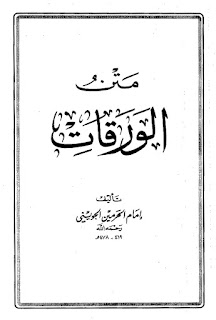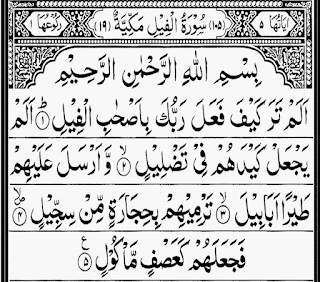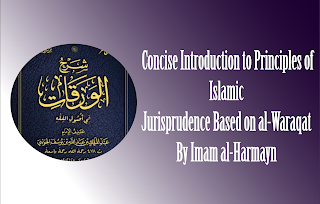Concise Introduction to Principles of Islamic Jurisprudence Based on al-Waraqat By Imam al-Harmayn Al-Juwayni [Part 18]
The contradiction of proofs refers to a contradiction between Shariah proofs from the Quran or the Sunnah.
For example, a certain proof may indicate lawfulness while another proof may indicate unlawfulness.
A contradiction can never occur between Shariah's proofs because Allah revealed them. However, imperfect understanding of human beings or misunderstanding may lead to believe that there is a contradiction between Shariah's proofs. In this case, the Muslim jurist is required to find a correct way to remove such a perceived contraction.
If there is a contradiction between two proofs from the Quran or the Sunnah, there are four cases
1. The contradiction is between two general proofs.
2. The contradiction is between two specific proofs.
3. The contradiction is between a general proof and a specific proof.
4. The contradiction is between two proofs that are general from one perspective and specific from the other.
The contradiction between Two General Proofs
1. It is possible to reconcile the two general proofs. In such a case, they are reconciled in a manner that each one of them is understood according to a situation that does not contradict the other. Thus, both proofs are applied.
For example, Messenger Muhammad [peace be upon him] said that the most wicked of witnesses are “those who offer testimony before being asked to testify.” He also said, “The best of witnesses are those who offer testimony before being asked to testify.” The scholars reconcile between them as follows: a witness is blameworthy if he offers testimony in favor of someone who knows about the testimony before the concerned person asks for it. On the other hand, someone knows about a testimony, but the concerned person does not know that he knows it. Then he tells the concerned person about the testimony and his willingness to testify before the judge to restore his right. In such a case, the witness is praiseworthy [Sharh Sahih Muslim].
2. If it is impossible to reconcile between two general statements and the date on which they were prescribed is unknown, then both rules should be suspended until proof supporting one of them is found. For example, Allah has prohibited simultaneous marriage to two sisters, whether free or slave, in the Quran [Surah an-Nisaa’:23] However, Surah al-Mu’minun: ayah [5-6] indicates that it is permissible to cohabit with two slave sisters simultaneously. Allah says, interpretation of the meaning, 23:5 Those who guard their private parts, 23:6 save from their wives or what their right hands possess, then they surely are not blameworthy. The scholars say that it is prohibited to simultaneously have a sexual relationship with two female slave sisters because it protects from the possibility of committing an unlawful act. Similarly, it is prohibited to marry two female slave sisters at the same time. And Allah knows best.
3. One of the proof abrogates the other if the dates on which they were prescribed are known. In such a case, the latter abrogates the former. For example, ayah [Surah al-Baqarah: 234] abrogated ayah [Surah al-Baqarah: 240]
2:240 And those of you who die, leaving wives, let them make bequeath for their wives, provision for a year…
2:234 Those of you who die, leaving wives, their wives shall wait four months and ten days…
Thus, the waiting period for a widow is four months and ten days.
The contradiction between Two Specific Proofs
1. It is possible to reconcile them. In such a case, they are reconciled in a manner that each one of them is understood according to a situation that does not contradict the other. For example, a narration mentions that Messenger Muhammad [peace be upon him] washed his feet [Sahih Al-Bukhari]. However, another narration says that Messenger Muhammad sprinkled water over his feet [Sunan Abu Dawood]. The scholars reconciled them as follows: they say that the narration saying that Messenger washed his feet was about ablution after minor impurity. On the other hand, they say that the narration saying that Messenger Muhammad sprinkled water over his feet was about renewing ablution.
2. If it is impossible to reconcile between them and the date, on which the rule is prescribed, is unknown, then both rules are suspended until evidence supporting one of them is found. For example, Messenger Muhammad [peace be upon him] was asked about how a man can have an intimate relationship with his wife when she menstruates. He said that he could enjoy the parts of her body that are above the navel and below the knee [Sahih Muslim]. However, in another narration, Messenger Muhammad said, “Do everything except sexual intercourse.” [Sahih Muslim] Some scholars have given preponderance to the first narration to be on the safe side.
3. If the date on which the rules are prescribed is known, then the latter abrogates the former. For example, Messenger Muhammad said, “I had forbidden you to visit the graves. Now, you may visit them.” [Sahih Muslim]
The contradiction between a General and Specific Evidence
If there is a contradiction between general and specific evidence, the general evidence is specified by the specific evidence.
For example, Messenger Muhammad [peace be upon him] said that one-tenth is the due zakat on land irrigated without effort, such as rain [Sahih Al-Bukhari].
This general statement includes little and much harvest. In another narration, Messenger Muhammad said, ‘No zakat is due on less than five awsuq of harvest.’ [Sahih Muslim] Thus, the general statement saying that one-tenth is the due zakat on land that is irrigated without effort, a general statement, is specified by the statement saying that no zakat is due on less than five awsuq of harvest. Accordingly, zakat is due on five awsqu of harvest and more.
The contradiction between Two Proofs: General According to one Perspective and Specific According to the other
If there is a contradiction between two proofs that are general according to one perspective and specific according to the other, those proofs are reconciled by specifying the generality of each one of them by the specificity of the other proof if there is a proof supporting to do so.
Allah says, interpretation of the meaning,
2:234 Those of you who die, leaving wives, their wives shall wait four months and ten days… The rule in this ayah is general and it speaks about pregnant women and other types of women. In other words, it is specific proof about the waiting period for widows in general.
In another ayah in the Quran, Allah, Exalted be He, says, interpretation of the meaning,
65:4 And those of your women, who have passed the age of menstruation, if you are unsure, their waiting period is three months and those who have not menstruated too, and the pregnant, their waiting period, is until they give birth. And whoever fears Allah, Allah will make his affair easy for him.
This ayah specifically mentions the waiting period for pregnant women, and it also refers to the waiting period for widows and other types of women. Thus, it is a specific statement about pregnant women and general about widows and other types of women. Thus, the generality of the first ayah is specified by the second statement. Hence, pregnant women are not included in the generality of the first ayah. Their waiting period is until they give birth, even if they are widows or other types of women. And Allah knows best.







